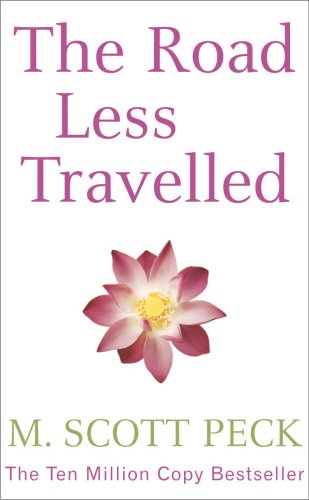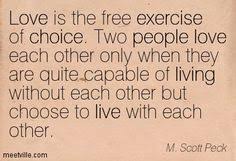Author: M Scott Peck
Genre: Self-Help, Psychology

Often when my teenage daughters come back upset, moaning about their problems, I lovingly direct them towards the famous opening lines of this book:
“Life is difficult.
This is a great truth, one of the greatest truths… because (only) when we truly see this truth, we transcend it.
Most do not fully see this truth that life is difficult. Instead they moan more or less incessantly, noisily or subtly, about the enormity of their problems, their burdens, and their difficulties as if life were generally easy, as if life should be easy.”
This book has sold more than 10 million copies, a very rare feat for a heavy, sober work like this. Dr Peck has distilled his years of experience as a psychiatrist (Harvard, Case Western) into a new way of living. He borrows from traditional philosophies like Buddhism, mystical Islam, Christianity and his own patient case studies to present “a new psychology of love, traditional values and spiritual growth.”
His basic premise is that the “tendency to avoid problems and the emotional suffering inherent in them is the primary basis of all human illness.” And therefore “let us teach ourselves and our children the necessity for suffering, the need to face problems directly and to experience the pain involved.” The first part exhorts us to develop a deep sense of discipline using 4 tools: “delaying gratification, acceptance of responsibility, dedication to truth and balancing.” Indeed, multiple studies, including Stanford’s Marshmallow experiment, have shown that kids that learn early on to delay gratification, to willingly forego instant pleasure, do much better in life. Similarly, balancing is the art of handling multiple conflicting priorities together.

The second section deals with Love. First “we are incapable to loving another unless we love ourselves, just as we incapable of teaching our children self-discipline unless we ourselves are self-disciplined.” Then he comes down heavily against the whole notion of Falling in Love, saying “the myth of romantic love is a dreadful lie”. “We fall in love only when we are consciously or unconsciously sexually motivated… and the experience of falling in love is invariably temporary.” Dependency is also not love and he severely criticizes parents and spouses who, ‘out of their love’, stifle and trap us without room to move or grow. Dependent people “do things for others, but their motive is to cement the attachment so as to assure their own care.” Such relationships “cannot be considered either healthy or genuinely loving, because the security is purchased at the price of freedom and the relationship serves to retard or destroy the growth of the individual partners… a good marriage can exist only between two strong and independent people.”

He then talks of religion. He criticizes blind faith, “a collection of inherently irrational ideas that serve to enchain people’s minds and oppress their instincts towards mental growth.” From there, we should evolve to the stage of independent scientific enquiry. He calls it “the religion of science” and gives a beautiful comprehensive manifesto which I am compelled to reproduce here:
“Science is a religion because it is a world view… (its) major tents are as follows: the universe is real, and therefore a valid object for examination… it follows certain laws and is predictable; but human beings are poor examiners, subject to superstition, bias, prejudice, and a profound tendency to see what they want to see. (hence, we need) the disciple of scientific method. It begins with actual experience. But simple experience itself is not to be trusted; to be trusted, experience must be repeatable, usually I the form of an experiment; moreover the experience must be verifiable, in that other people must have the same experience under the same circumstances.”
But, Peck does not stop here. He exhorts us not to take science as the new dogma and continue to marvel at nature and levels of consciousness. He refers to “God beyond God” or how sophisticated Christians used to proclaim joyfully, “God is dead. Long live God”. He instigates us to think: “Is it possible that the path of spiritual growth leads first out of superstition into agnosticism and then toward an accurate knowledge of God?” He quotes a beautiful Sufi couplet:
“Until college and minaret have crumbled
This holy work of ours will not be done.
Until faith becomes rejection,
And rejection becomes belief
There will be no true muslim”
The books has its set of controversy. Peck’s belief in open marriage (he has talked often of his many adulterous relationships and finally had a divorce) and his genuine belief in miracles and spirits has often been questioned. While the initial part of the book, where he leverages his vast work as a therapist, is really deep, I got a sense that the latter part of the book was delving in areas like synchronicity, dreams and unconscious brain where Peck was clearly out of depth (and even proven wrong with the latest neuroscience research). Also, while the concept of discipline and facing problems is solid, there is too much emphasis on suffering. Life offers all shades, some very enjoyable, living in the moment, and somehow here we dwell on only the ‘difficult’ part.
Why you should read the book: Life indeed is difficult and we all face problems and conflicts, both within and without. Confronting and solving problems is a painful process which most of us attempt to avoid. Learn then from a trained psychiatrist, one of the best in the field, to reach a higher state of self-awareness. Understand the value of self-discipline, the true nature of love, distinguishing dependency from love, and becoming a more compassionate person.
Goodreads Link: The Road Less Traveled: A New Psychology of Love, Traditional Values and Spiritual Growth by M. Scott Peck | Goodreads

 This information will never be shared with third party
This information will never be shared with third party
Seems interesting. Will definitely read.
I genuinely loved this book. I remember halting to get out a note pad and writing down this beautiful quote, “God is all that entropy is not”. It truly made me feel like there is an overwhelming power of “good” in the universe. It truly hit since I used to be nihilistic, and he managed to having it all make sense. Thank you for writing about this beautiful book!